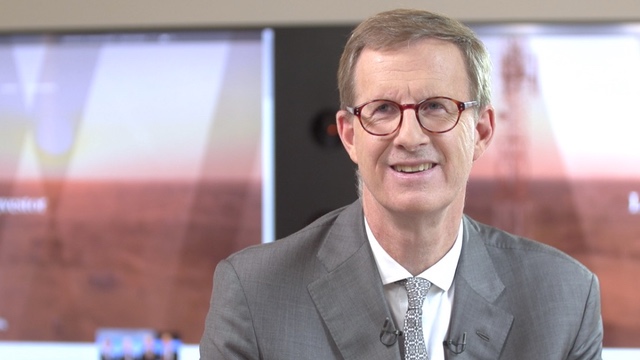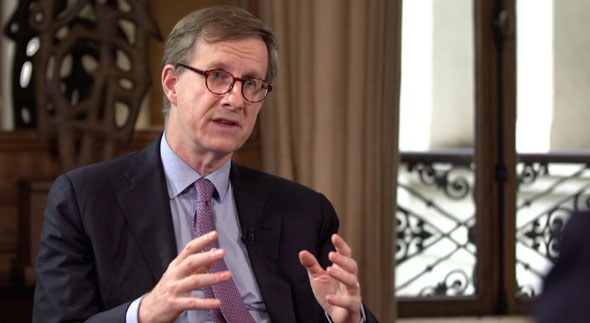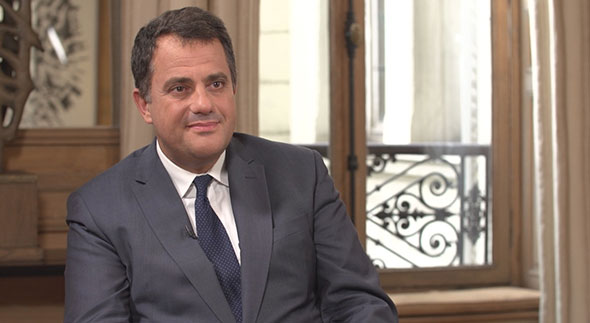EuroBusiness Media (EBM): Wendel, one of Europe’s leading investment firms, reports results for the first half of 2011. Frédéric Lemoine, welcome. You are the Chairman of the Executive Board of Wendel. What are your comments on Wendel’s first half results?
Frédéric Lemoine (FL): The first half of the year has been excellent for Wendel Group’s companies. They have been growing quite well, on average + 8.6% organically, resulting in a global growth rate of more than 20% for the consolidated Wendel Group. The operational results of our companies have been growing all across the board, resulting in net income from business sectors group share for Wendel, increasing by 42%. So really it has been a great first half, with some excellent results such as Deutsch, which has been growing by 27% in their connectors business, which was really great to see.
EBM: Standard and Poor’s raised your credit rating by a notch - it’s true that you have reduced the cost of your debt and rescheduled it. Is the issue of your debt level now behind you or is there still much work left to do?
Frédéric Lemoine: Wendel has a very solid financial structure and it’s true that since the beginning of the year we have further reinforced the structure of our balance sheet by extending some maturities, by reimbursing some additional €1.3 billion of debt and Standard and Poor’s certainly took that into account. All in all, since 2009, we have reduced our gross debt by 40%, by €3.4 billion and that leaves us with €5 billion of debt, balanced by €1 billion of cash in our balance sheet. So I think we are in a very good, solid situation with absolutely no debt to reimburse before 2013 and with extended maturities, both for our bank debt and for our bond debt.
EBM: What are the main takeaways from the portfolio's news flow in the first half of the year?
Frédéric Lemoine: We have been very active managing our stakes in Saint-Gobain and Legrand, in particular, because we have renewed our long-term shareholders agreements around these two companies. First, with Saint-Gobain, Wendel and Saint-Gobain have agreed on common principles to manage our stake for the next ten years. This is really a long-term shareholder type of agreement. We have agreed on our participation to the Board and also the other support we bring to the strategy developed by Pierre-André de Chalendar for Saint-Gobain for the coming years. And this is really a trust that this agreement shows and demonstrates, and this trust has led us to increase our stake in Saint-Gobain recently in August, to sell the puts that we had on the share price, because we really believe that the current share price of Saint-Gobain is much below the real value of the company. And we did more or less the same with Legrand. We had to sell an additional stake in Legrand at the beginning of the year, in March, which reduced our stake to 11%. But we have agreed following this operation with KKR, our co-shareholder, to manage jointly our stakes in Legrand for the next five years and to be able to support the company in its international development for the coming years. So on the back of these long-term relationships, we have worked with Legrand, Saint-Gobain, but also with Bureau Veritas to increase their efforts in terms of external growth. They have made 19 acquisitions since the beginning of the year, most of them in fast-growing countries – 12 out of the 19 – and we have helped Legrand, for instance, to take control of the number one of the UPS (uninterruptible power supply) market in Brazil, the SMS company. And we’ve also supported Saint-Gobain in the control that they took of Brossette in France.
EBM: You only mentioned some of your historical stakes. Does that mean you are not making any new investments?
Frédéric Lemoine: No. This year has been marked by the return to new investments for Wendel. It was a long time since we invested in new sectors, but we did so in three different businesses, through Oranje-Nassau Developpement, our structure dedicated to growth investment or innovative investments and this has been done with Parcours, one of the French leaders in the operational leasing industry. This is a company dedicated to more international business in the future. It was also the case in Germany with exceet, the European leader of embedded electronic systems, working notably for the medical industry, and we recently announced a very interesting acquisition with the control of Mecatherm, which is the world leader for baking equipment, which means that 60% of the ovens in the world that produce baguettes are produced by Mecatherm in the Eastern part of France.
EBM: Your net asset value has been impacted by the decline of listed companies in the portfolio, such as Bureau Veritas, Saint-Gobain and Legrand. Is this a matter for concern or are you confident in the outlook for these companies despite the uncertain macro-economic environment?
Frédéric Lemoine: We are absolutely confident in the outlook of these companies. However, this is true that the summer of 2011 will be remembered for the very sharp reduction and crisis in the financial markets, and since our NAV is calculated on the 22nd of August on the basis of the previous 20 trading days, obviously, it is fully impacted by the decrease in the value of the listed assets. However, we are a long-term shareholder, we will certainly not change our strategy because of the stock market evolutions during the summer. But it’s also fair to say that this financial turmoil can have some real economic effects and we are very cautions looking at the environment and preparing our companies, just in case they have to adapt. However, we don’t see anything changed for the moment.
EBM: Are you still in line to reach your value creation target of €1.5 to €2 billion in private equity by 2013?
Frédéric Lemoine: Yes, we are very confident in the outlook of Materis, Deutsch and Stahl and we confirm that their expected value in our NAV could be between €1.5 and €2.5 billion at the end of 2013. However, it is true that we value these companies by comparing with listed comparables and after the month of August 2011, clearly the comparison has led us to reduce the value in our NAV for Materis, Deutsch and Stahl. But we believe that this is only a moment in the long history of these companies and they are still on track for meeting their guidance for 2011. Materis and Deutsch have increased their guidance, whereas Stahl has reduced it slightly and they are perfectly in line for their five-year development plan leading them to 2013.
EBM: Your strategy has been to try to increase your exposure to fast-growing countries. Where do things stand today?
Frédéric Lemoine: Our strategy is still to invest heavily in fast growing countries, through our companies. We have, for many years, decided to choose companies and sectors that can be exposed to the growth of emerging countries, notably the demographic growth; and we are very pleased to have done so when we see the differences which exist today in the low growing countries in Europe and in the US and also the situation – which has still a very strong momentum – in China, in India, in Brazil or in other fast growing countries. Clearly, to have pushed our companies like Bureau Veritas, for instance, to acquire companies in new countries has been key - when one sees that Bureau Veritas has more than 50% of their revenues in this kind of country – it is clearly something that makes us pretty confident in the future, given the changes that exist in the world economy and the shifts of balance between the old world and the new world.
EBM: Finally, what is your outlook for the second half of this year?
Frédéric Lemoine: The outlook for our companies for the second half of the year is more or less unchanged compared to the guidance that we have given at the beginning of the year. Bureau Veritas, Saint-Gobain and Legrand have all announced that they confirm their objectives for the year. We have increased the expectations in terms of revenues for Materis and Deutsch and slightly decreased our expectation for Stahl, so all in all it’s really a very good year that we expect from all our companies. It’s also the case in terms of results, where we see an increase in margin for most of our companies. So this will be a good year, if, of course, nothing changes in the economic environment, but we don’t see any operational indicators that could make us think that something would change in the near future.
EBM: Frédéric Lemoine, thank you very much.
Frédéric Lemoine: Thanks to you.





